Creating a Safe Haven for Pakistan’s Youth
Huddled around a table, surrounded by a group of teenagers who volunteer every evening, Sohail Rahi and Nadeem Baig explain the birth, vision and achievement of the Lyari Youth Cafe in Karachi.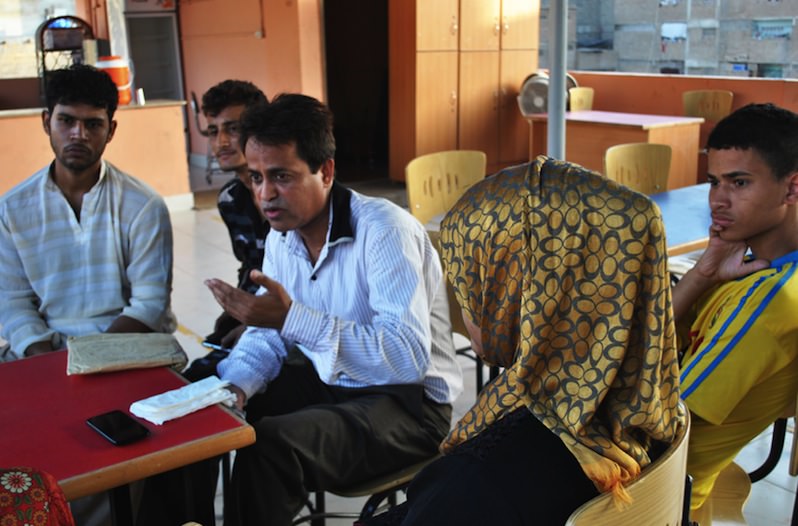 Sohail Rahi, center, co-founder of the Lyari Youth Cafe, talks with young volunteers including Zohaib Panhwar, far left, and Bakhtawar Imtiaz, second from the right. Nudrat Kamal
Sohail Rahi, center, co-founder of the Lyari Youth Cafe, talks with young volunteers including Zohaib Panhwar, far left, and Bakhtawar Imtiaz, second from the right. Nudrat Kamal
Editor’s note: This piece by Nudrat Kamal is the last in a three-part series about the unique challenges and opportunities that Pakistani youth are facing that were written for the Global Voices: Truthdig Women Reporting project (click here for more information about Global Voices). The other two stories, by Zubeida Mustafa and by Kamal, can be found here and here, respectively. Click here for a photo album featuring images of people mentioned in this interview, or view them in the slide show below.
Sohail Rahi, 44, and Nadeem Baig, 45, the duo who established the Lyari Youth Cafe in Karachi, Pakistan in 2012, were in their twenties when they first took up the cause of the youth in their neighborhood. In 1990, they began organizing street schools to make education accessible to the underprivileged boys and girls of Lyari. Two years ago, the idea of the street schools was developed further, and the Youth Café was launched.
When I visited them recently, we sat on the rooftop of the two-story building in the heart of the city’s bustling Lyari neighborhood that houses their brainchild. On one end of the roof is a small kitchen designed to provide free tea and coffee to visitors. The remaining area has small tables and chairs. On the floors below are makeshift desks where free classes are held for local children. The walls are covered with bright handmade posters proclaiming messages of peace and positivity.
Huddled around a table, surrounded by a group of teenagers who volunteer every evening, Rahi and Baig explain the birth, vision and achievement of the cafe, a safe haven for the area’s youth. They are proud of their success in changing the landscape of Lyari, a troubled area of Karachi plagued by drugs, gangs and violence.
Nudrat Kamal: How did the idea of the Lyari Youth Cafe originate?
Sohail Rahi: Nadeem and I have been involved with a child and youth welfare organization for years and have been working for the young people of Lyari in particular. Previously, this organization operated several street schools in the area, which were functional even during times of great turmoil in Lyari. It was always our intention to continue working for the youth.
Nadeem Baig: I used to look at the young boys of the neighborhood, hanging around at local teashops, whiling away their evenings. I often thought that there should be a similar spot for them, but one which had a focus on learning and healthy debate to encourage the youth to exchange ideas and even disagree, albeit constructively and with civility.
NK: How did you get this project off the ground?
NB: What we had initially envisioned was just a small dhaaba [a makeshift tea shop commonly found around the city]. Given our modest budget, we had even planned to reshape tables and chairs from broken school benches.
SR: During this time, the Karachi Youth Initiative, a USAID-funded organization, had just begun work in the city. They were interested in our idea, and it was with their financial support that we made the cafe and furnished it.
NK: What do you think has been the cafe’s greatest accomplishment?
SR: I am really proud of the talent that the cafe has provided expression to. We have kids showing an interest in art, music and photography. We recently got a professional filmmaker to train the children, who then went on to make exciting documentaries about Lyari.
NB: In addition to providing a platform here at the cafe for these youth, we also facilitate their participation in other competitions and events around the city, ensuring transport and other such logistics. Thus, the youth of Lyari get exposure to life in Karachi. They also have a chance to interact with people of other areas, which helps foster peace and goodwill.
NK: Lyari is known in the Pakistani media mostly as a hotbed of crime and violence. Has the cafe changed this perception?
SR: Whenever the national media talked about Lyari, the focus was always on the drug mafia, the crime and violence. But the truth is that Lyari is so much more than that. We have diehard football fans here, and deeply passionate and creative young people. Through the activities and events of the youth cafe, Karachi and the country at large is finally seeing the beautiful side of Lyari too.
NK: What does the cafe plan to do in the future?
SR: Even though we have faced criticism and even harassment from the conservatives of the area about encouraging boys and girls to mingle, we will continue to do our work and remain a safe place for Lyari’s youth.
NB: Last month, we facilitated the first ever Lyari Film Festival that was organized by several groups. With this and other similar events, we hope to continue to keep the incredible talent of Lyari’s youth in the limelight.
Your support matters…Independent journalism is under threat and overshadowed by heavily funded mainstream media.
You can help level the playing field. Become a member.
Your tax-deductible contribution keeps us digging beneath the headlines to give you thought-provoking, investigative reporting and analysis that unearths what's really happening- without compromise.
Give today to support our courageous, independent journalists.
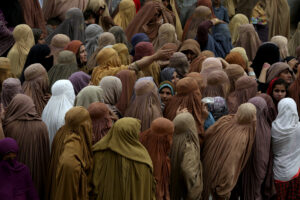
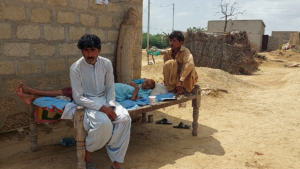
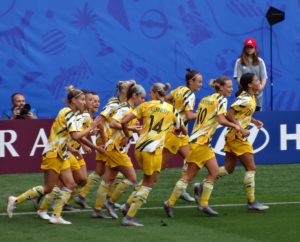
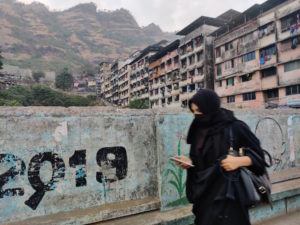
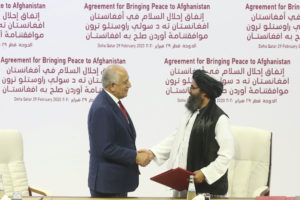

You need to be a supporter to comment.
There are currently no responses to this article.
Be the first to respond.